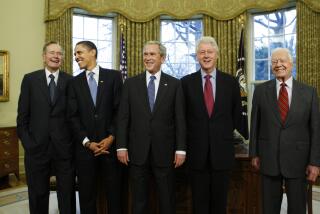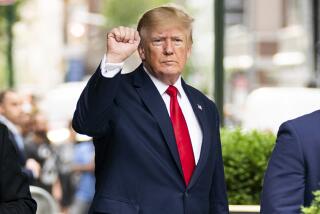Don’t Yearn for Leaders, Yearn to Be Led for a Purpose
All societies look for leaders. At times they don’t have to look hard because some leaders anoint themselves. Witness Saddam Hussein, Fidel Castro, Josef Stalin and the warlords of central Africa.
But nowhere, at the top level, are the rules more complicated or the process more drawn out than in the United States. We have devised a process that is infinitely complex, corrupted by money and, with its perpetual “democratic reforms,” numbingly boring. Hardly anyone fully understands the means by which the presidential candidates are chosen, nor, judging by the convention TV ratings this summer, wants to observe it.
Yet we do care about the kind of candidates we get, even as we question whether the methods we use are likely to achieve the results we want. There is good cause to doubt that they do. One reason for this is that despite--or perhaps because of--the long and expensive selection process, the leaders we end up with seem less qualified than the ones we read about in our history books.
We mythologize the founding fathers (indeed, an impressive lot), Lincoln, Wilson and the two Roosevelts, and even the foot soldiers of the “greatest generation,” as though we shall never see their likes again. Maybe we won’t. But the reason is not that one generation is born better than another, or that the problems today defy solution. Rather it is that the conditions under which leaders are chosen has changed dramatically, even within the past few decades.
Running for high public office today is no longer primarily a political decision; it is an economic one. It means raising millions, even hundreds of millions, of dollars to pay for the campaign. How many people are willing or able to do this? What price will the donors exact for their largess? Beholden to big financial contributors, how faithful can the politician be to the needs of his other constituents, let alone to his principles? Knowing how the system works, how much trust can the citizen have in his freely elected--but economically driven and beholden--leader?
This kind of financial dependency corrupts the relationship between the voters and those they elect. Elections increasingly are seen as a contest between the powerful, moneyed interests that “sponsor” the candidates. Citizens reasonably begin to ask: “Whose interests does ‘my’ leader represent?” Once that happens, it is not just the election but the whole political process that is tainted. No wonder that we wax nostalgic over the leaders of the past.
Many of us seem confused as to what we want an elected leader to be: a person to articulate and advance the interests of our society or a role model for teaching moral lessons to children? Hardly any other society asks its leaders to pursue such disparate and unrelated objectives. There is a good reason for this: The two qualities rarely go together. We know that in our own lives. By pretending that we can, or reasonably should, want both, we merely encourage hypocrisy from our politicians, and flagellate them when they stray from virtue in their private lives--or even force them from public life, as we did presidential candidate Gary Hart in 1984.
Given all the barriers to running for the presidency, it is hardly surprising that we might feel that today’s leaders don’t live up to those of the past. How many qualified people would want to put themselves through the ordeal that it involves? There are a lot of other ways to be famous, and even rich to boot. Ask Bill Gates. Or Stephen King. Or Robert Rubin. This means that the pool of eligible leaders probably is smaller than it used to be. The notion of diminishing results might not be in our imaginations after all.
Thus it may be that, because we put our potential leaders through the hoops that we do, we are getting the candidates that we deserve. Sometimes this works out fairly well. But if it doesn’t, we have only ourselves to blame. This is, after all, a democracy. One way or another we set the rules. If we really wanted the worst ones to be changed--like, for example, campaign finance laws--they would be.
Presidential candidates inevitably assure us of their ability to lead us in directions that we presumably want to go. In effect, however, most of the time they are not like leaders but managers, like good corporate executives of successful firms. Those who launch dramatic innovations, like promoting a “new Coke” over the beloved old one, are deservedly kicked out.
Leaders are for times of crisis, when the nation is divided and confused. At such moments, brave and even visionary leaders can step forward and rally their people. Winston Churchill was such a leader. So was Charles de Gaulle and, despite his innate caution, Franklin D. Roosevelt. But anger and despair can induce even democratically inclined peoples to support malevolent leaders. The Germans elected Hitler and the Italians hailed Mussolini.
We make too much of leadership. In itself, it is neither a good nor a bad thing. The question is: Leadership for what, and by what means? We should be cautious about those who promise leadership but are vague about what they will do and how they will do it. One of the problems of the yearning for leadership is that it can degenerate into hero worship. And as Ralph Waldo Emerson wrote, “The love of the hero corrupts into worship of his statue.”
One of the particular weaknesses of democracies is the tendency of politicians to pander to vocal groups of voters (and, of course, to special interests) and to follow the most politically expedient path. But what is tolerable in good times can be dangerous in periods of crisis. Those are the moments when a true leader must have not only vision but the willingness to challenge popular opinion. He or she must not only lead the pack, which is easy enough, but guide and inspire.
A great president, the columnist and political philosopher Walter Lippmann wrote several decades ago, must be “not only executive, organizer, politician and popular leader” but also a “popular teacher.” Such a statesman, he continued, “must act boldly in advance of his constituents. When he does this, he stakes his judgment against what the people will in the end find to be good against what the people happen ardently to desire.”
There has been no shortage at the conventions of noisy people, especially in the skyboxes, telling the candidates what they want. It doesn’t take a leader to hear them. But it does take a leader to know when to tune them out and, even while taking all the voices into account, to respond in the end only to the one within.
More to Read
Get the L.A. Times Politics newsletter
Deeply reported insights into legislation, politics and policy from Sacramento, Washington and beyond. In your inbox three times per week.
You may occasionally receive promotional content from the Los Angeles Times.










